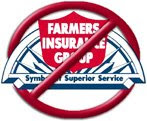Foremost Insurance Company and Farmers Insurance Company ask Arkansas judge to remove himself from litigation
Insurance companies ask Arkansas judge to remove himself from litigation
4/9/2008 8:54 PM
By Michelle Massey, Texarkana Bureau
Arkansas Circuit Court Judge Kirk Johnson
TEXARKANA, Ark. -- Defendant State Farm Insurance Company has filed a motion to recuse Arkansas Circuit Court Judge Kirk Johnson from ongoing proceedings in a class action case that accuses insurance companies of conspiring "to create, execute, enforce, and maintain" an unjust overhead and profit scheme.
The original lawsuit, filed Sept. 8, 2004, alleges claims of civil conspiracy, unjust enrichment, fraud, and constructive fraud by accusing the insurance companies of not disclosing or paying to the insured's the general contractors' overhead and profit, whenever the repair of an insured's loss required the services of at least three trades.
Although previous damage claims were paid by the insurance companies, the plaintiffs argue they are entitled to the additional general contractors' overhead and profit, the paid-for- benefit is 20 percent of the estimated job or construction cost.
Plaintiffs are seeking less than $75,000 total recovery for each plaintiff or potential class member.
State Farm filed the motion to recuse under court seal on March 13. Defendants Foremost Insurance Company and Farmers Insurance Company have joined with State Farm's motion.
The joinder motion focuses on five homeowner property damage claims that Judge Johnson filed during the relevant time for the class action. The defendants believe that the personal knowledge the Court obtained from these claims will cause him to lose impartiality.
Foremost states that "because the impartiality of a judge who has personal knowledge of disputed evidentiary facts might reasonably be questioned, the Court should recuse itself from this matter in its entirety."
The motions state that the Judge's previous claims could "create in reasonable minds a perception that the judge's ability to carry out judicial responsibilities with integrity, impartiality and competence is impaired."
The motions to recuse follow a letter from Judge Johnson responding to Chicago attorney James Gaughan, in which the Judge discusses his 25-30 year relationship with State Farm for automobile and homeowner's insurance coverage.
Judge Johnson states he believes he would not be a potential class member "because I don't recall having three or more tradesmen involved in the repair work." For two particular claims, the Judge tells the attorney that the requests do not constitute claims as he only made inquiries regarding the damage to his home and other structures and did not receive compensation.
Although the original letter from the attorney is not on file with the circuit clerk's office, Judge Johnson's reply indicates attorney Gaughan did not ask for recusal but even if he did, Judge Johnson states he does not believe the Arkansas Code of Judicial Conduct would require his recusal.
Further, Judge Johnson states Arkansas judges are routinely excluded from settlements in class action cases. Continuing, the Judge states that he does not hold any ill feelings about State Farm and will waive any rights he or his family might have as a class member.
The motion to recuse follows an intense ongoing discovery dispute between the parties. Recently, the plaintiffs filed a motion to disqualify Foremost Insurance Company's attorney Richard Griffin and his law firm Jackson Walker LLP.
The plaintiffs' argue disqualification is necessary because Griffin acted as a witness and an advocate, violating Arkansas Rules of Professional Conduct by filing an affidavit relating to the burden and expense of Foremost Insurance Company producing claim files.
Griffin responded to the motion arguing that the affidavit at issue only deals with possible attorney fees, "that would be incurred responding to Plaintiffs' overbroad and premature class-wide discovery requests, a clear exception to the lawyer-witness rule."
Moreover, Griffin's response states "just like Plaintiffs' abusive discovery requests - which required Foremost to quantify the fees and costs that would be incurred as a consequence - Plaintiffs' actions here once again smack of tactical litigation."
Chivers v. State Farm. Case No: 2004-294-3.
Source: http://www.setexasrecord.com


